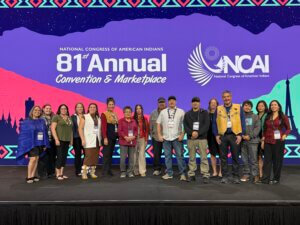 The National Congress of American Indians (NCAI) Annual Convention recently took place in Las Vegas, Nevada, bringing together Tribal leaders and representatives from across the country. Tanana Chiefs Conference (TCC) actively participated in the event, with Chief Brian Ridley, members of the Executive Board, and representatives from the Emerging Leaders program—Mackenzie Englishoe (Gwichyaa Zhee), Robert Pilot (Nulato), and Natalie Newman (Rampart)—in attendance.
The National Congress of American Indians (NCAI) Annual Convention recently took place in Las Vegas, Nevada, bringing together Tribal leaders and representatives from across the country. Tanana Chiefs Conference (TCC) actively participated in the event, with Chief Brian Ridley, members of the Executive Board, and representatives from the Emerging Leaders program—Mackenzie Englishoe (Gwichyaa Zhee), Robert Pilot (Nulato), and Natalie Newman (Rampart)—in attendance.
A key highlight of the convention was the panel discussion titled “Alaska’s Unique Model of Self-Determination,” which spotlighted the innovative structure of governance shaped by the Alaska Native Claims Settlement Act. The panel, led by Chief Brian Ridley, featured Shauna Hegna of Koniag, Nathan McCowan of St. George Tanaq, Richard Peterson of Central Council of Tlingit and Haida Indian Tribes, and Melanie Bahnke of Kawerak. Together, they shared insights on how Alaska’s Tribes, Village Councils, and corporations collaborate to address shared challenges and achieve collective goals. The session provided valuable lessons for Tribes outside of Alaska, showcasing the power of cooperation and community-driven leadership.
In addition to participating in panels and discussions, TCC submitted two resolutions to the NCAI delegates. Both resolutions were successfully passed:
- Resolution 036: Support and Enhance the Bureau of Indian Affairs Small Tribe Supplement Program – This resolution seeks to ensure continued support and enhancement of critical funding for small Tribes.
- Resolution 037: Opposition to legislation that would allow construction of the 211-mile Ambler mining road through the Gates of the Arctic National Preserve – This resolution opposes projects that threaten the pristine environment and traditional lands of Alaska Native communities.
TCC’s active involvement in the NCAI Annual Convention underscores its commitment to advocating for the interests of Interior Alaska Tribes and contributing to national discussions on Tribal sovereignty, self-determination, and governance. The conference was an excellent opportunity to build relationships, share knowledge, and strengthen partnerships with Tribes and organizations across the nation.
